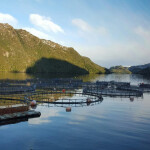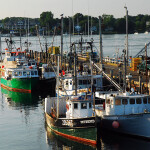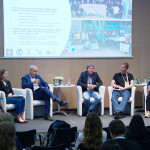The 47th United States-Japan Natural Resources Scientific Symposium “Marine Aquaculture in a Changing Environment” will be held November 12 to 15, 2019, in Okinawa, Japan. It will be the last year for the three-year theme, “Marine Aquaculture in a Changing Environment.”
The symposium is part of a regular collaboration between NOAA Fisheries and the Japanese Fisheries Research and Education Agency, organized through the U.S.-Japan Natural Resources (UJNR) Aquaculture Panel. The panel is an annual meeting framework that allows scientists to share research results, new technology, and approaches to sustainable seafood farming. Last year’s meeting took place in Mystic, Connecticut, U.S.A.
Mike Rust, a NOAA Fisheries scientist and the U.S. chair of the UJNR Aquaculture Panel, told SeafoodSource the exchanges represented an important path to improving the state of U.S. domestic aquaculture.
“The learning opportunities are tremendous on a number of fronts. The United States is behind in both the scale of marine aquaculture and the science and technology effort to support a sustainable industry. This partnership gives U.S. researchers a chance to understand where Japan is going in aquaculture and learn from Japan’s experience,” Rust said. “The low-hanging fruit in some ways is to look around the world to see where other people are on the technical side.”
A patchwork of policies at the federal, state, and local levels – some of them in conflict with one another – create make it difficult to grow the U.S. aquaculture sector, Rust said.
“The U.S. has a collection of laws designed for other purposes – clean water, endangered species – not a unifying act that deals with aquaculture. This makes it more difficult to get permitting for new projects. It’s not impossible – it’s not that it can’t be done, because some people are doing it – but it’s unclear, and businesses like certainty.”
Rust declined to say how he thought current aquaculture policies should be changed, but advocated that regulations should always aim to be science-based.
“Science is not making the policy, but just informing the policy,” Rust said.
In the short-term, Rust said that aquaculture operations growing seaweed or bivalves like oysters are having an easier time with regulations than with fish-growers, since science is showing with increasing proof that growing seaweed and bivalves commercially can actually benefit the ocean.
Gunnar Knapp, a professor emeritus of economics at the Institute of Social and Economic Research at the University of Alaska, Anchorage did address the question of what should be done to fix U.S. policies on aquaculture in his 2012 paper, “The Political Economics of United States Marine Aquaculture.”
“In much of the United States, local, state, or national policies constrain the development of marine aquaculture to a scale far below its economic potential,” he wrote.
In his paper, Knapp wrote that the state of Alaska’s ban on all finfish farming and the absence of an enabling regulatory framework for aquaculture in offshore federal waters as examples of how policies in the U.S. are harming or inhibiting the growth of U.S. aquaculture.
Since the 2012 report, NOAA has set up a permitting process for offshore aquaculture in the Gulf of Mexico, but the rules were challenged in court by a public interest group and were struck down in court. The court ruled that the Commerce Department’s authority over fishing, worded in regulations as “harvesting” of fish, did not include giving the National Marine Fisheries Service (NMFS) the authority to create an entirely new regulatory permitting scheme for aquaculture operations.
Knapp’s paper puts forth some possible reasons that U.S. polices have been unfavorable towards marine aquaculture: (1) Marine aquaculture is new and small; (2) Fish and marine waters are traditionally public resources; (3) Many Americans perceive potential negative effects of marine aquaculture without offsetting positive effects; (4) NGOs have systematically and effectively opposed marine aquaculture; and (5) The governance system for leasing and regulation is structurally biased against U.S. marine aquaculture.
Among the policies that affect marine aquaculture, Knapp categorizes them into leasing policies, regulatory policies, and other policies. He also notes that it is not just the policies that matter, but also how predictable and stable they are, and how long it takes to get leases and regulatory approval. As the recent court decision on offshore aquaculture leases shows, U.S. policies are highly unstable.
He gives an example of a Washington state shellfish farmer who waited 15 years for a site permit due to a delay by the Army Corps of Engineers’ in implementing its Nationwide Permit 48, delays in Endangered Species Act (ESA), the Magnuson-Stevens Fishery Conservation and Management Act (MSA) certifications, and delays in updates to the State of Washington’s Shoreline Master Program. Out of patience, the grower finally leased a site in Canada.
Knapp further a survey of U.S. molluscan shellfish growers who said they perceived significantly higher institutional risks associated with regulation and leasing than risks associated with markets, the environment, or climate.
While the paper suggests a range of actions, including better advocacy, on the leasing and regulatory side, in a 2016 follow-up paper (“The Political Economics of Marine Aquaculture in the United States,” co-authored with current NOAA Fisheries senior advisor for seafood strategy Michael Rubino) Knapp praises efforts in other countries to bring stakeholders together to address environmental and social issues together. Knapp supports NOAA’s National Shellfish Initiative and local initiatives inspired by it; and he is glad that after 15 years of debate, a NOAA rule to implement the Gulf of Mexico Fishery Management Plan for Offshore Aquaculture was finally issued on 13 January, 2016.
Photo courtesy of University of Alaska, Anchorage







